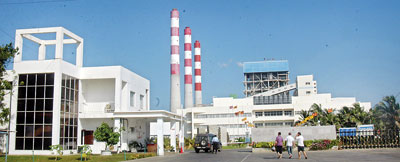News
PUCSL sheds light on power dispute with CEB
The Public Utilities Commission of Sri Lanka (PUCSL), the country’s power sector regulator, has brushed aside Ceylon Electricity Board’s objection to a power generation expansion plan approved by the commission.

The coal power plant at Norochcholai: Govt. promotes coal-free power generation
Last week, CEB General Manager A.K. Amerasinghe conveyed its objections to the Least Cost Long Term Generation Expansion Plan (LCLTGEP), pointing out that the Commission had arbitrarily “amended” the LCLTGEP 2018-2037 sent by the CEB.
The base case plan recommended by the CEB contained a mixture of coal, Liquefied Natural Gas (LNG) and renewable energy plants, though the plan eventually approved by PUCSL contained no coal power plants. The CEB, therefore, argued that the regulator had exceeded legal powers vested with it under the Sri Lanka Electricity Act (SLEA) in arriving at its decision and as such, the CEB could not accept the Commission’s decision.
PUCSL’s Director General Damitha Kumarasinghe , however, dismissed the CEB’s argument, insisting that under the Electricity Act, there was no provision for the CEB to object to the regulator’s decision. In an exclusive interview with the Sunday Times this week, Mr. Kumarasinghe pointed out that under the Act, the PUCSL is the authority tasked with ensuring uninterrupted electricity supply to the country. “The LCLTGEP is one of the instruments required to fulfil this obligation,” he stressed, adding that it was “very clear from the Act that the Commission has the mandate to review, amend and approve the plan.”
Mr. Kumarasinghe said the CEB’s objection that the Commission had violated guidelines was a non-issue. “Guidelines do not supersede the Act. The Act always prevails and we can use powers vested with us by the Act at anytime,” he said.
The Director General said the regulator had held “completely transparent” public consultations regarding the LCLTGEP prior to arriving at its decision. While the PUCSL had powers to go for a legally binding public hearing, it did not do so as it believed such a hearing was not required at this stage, he said.
Mr. Kumarasinghe also refuted the CEB’s allegation that the plan it approved was not the one submitted by the Board. “The CEB recommended its base case plan. But it submitted several scenarios, including a scenario where there was no further coal development. We found the no-coal scenario to be the cheaper and in keeping with least cost principles, we approved that. All plans were submitted by the CEB,” Mr Kumarasinghe claimed.
The only adjustments made to the data submitted by the CEB were regarding the price of diesel, coal and LNG. This, the PUCSL felt, was not in keeping with actual prices at the time of the plan’s preparation, the DG insisted.
Regarding allegations made in some quarters that the PUCSL had also inserted power plants on its own into the LCLTGEP, Mr Kumarasinghe said what the Commission did was to “fully optimise” plants that were in the CEB’s plan. As such, for example, the Commission thought that rather than construct a 300 Mega Watt (MW) power plant, it was better to construct the plant in two stages with two 150MW units, because it would result in a gain of the capital cost. “The plants are the same as in their plan, but this approach is financially cheaper.”
The Government’s future energy policy also does not involve coal, he pointed out. According to the Power and Renewable Energy Ministry’s “Energy Sector Development Plan 2015-2025,” the goal is to make the country “an energy self-sufficient nation” by 2030. According to the objectives set out in this plan, the target is to boost the country’s total renewable power to 60 percent by 2020. Currently, it is at 50 percent. The Government hopes to reach the ambitious goal of powering the entire country using renewable energy and “indigenous” sources, mainly natural gas by 2030.
“We have asked the Government repeatedly if there has been a change in this policy and it has communicated to us a change of policy,” Mr Kumarasinghe said. As such, the current policy clearly does not provide any room for further development of coal power plants either, he added.
The DG, however, said he did not foresee the issue between the regulator and the CEB escalating. “They have lawyers. We have lawyers. Let them discuss the matter and find a solution. The bottom line is that we need to work together to avert a future power crisis,” he emphasised.

